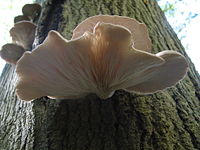
Photo from wikipedia
In this study, a bacterial strain SR-2-1/1 was isolated from textile wastewater-irrigated soil for its concurrent potential of plant growth promotion and azo-dye decolorization. Analysis of 16S rRNA gene sequence… Click to show full abstract
In this study, a bacterial strain SR-2-1/1 was isolated from textile wastewater-irrigated soil for its concurrent potential of plant growth promotion and azo-dye decolorization. Analysis of 16S rRNA gene sequence confirmed its identity as Bacillus sp. The strain tolerated high concentrations (i.e. up to 1000mgL-1) of metals (Ni2+, Cd2+, Co2+, Zn2+, and Cr6+) and efficiently decolorized the azo dyes (i.e. reactive black-5, reactive red-120, direct blue-1 and congo red). It also demonstrated considerable in vitro phosphate solubilizing and 1-aminocyclopropane-1-carboxylic acid deaminase abilities at high metal and salt levels. Bioinformatics analysis of its 537bp azoreductase gene and deduced protein revealed that it decolorized azo dyes through NADH-ubiquinone:oxidoreductase enzyme activity. The deduced protein was predicted structurally and functionally different to those of its closely related database proteins. Thus, the strain SR-2-1/1 is a powerful bioinoculant for bioremediation of textile wastewater contaminated soils in addition to stimulation of plant growth.
Journal Title: Bioresource technology
Year Published: 2017
Link to full text (if available)
Share on Social Media: Sign Up to like & get
recommendations!